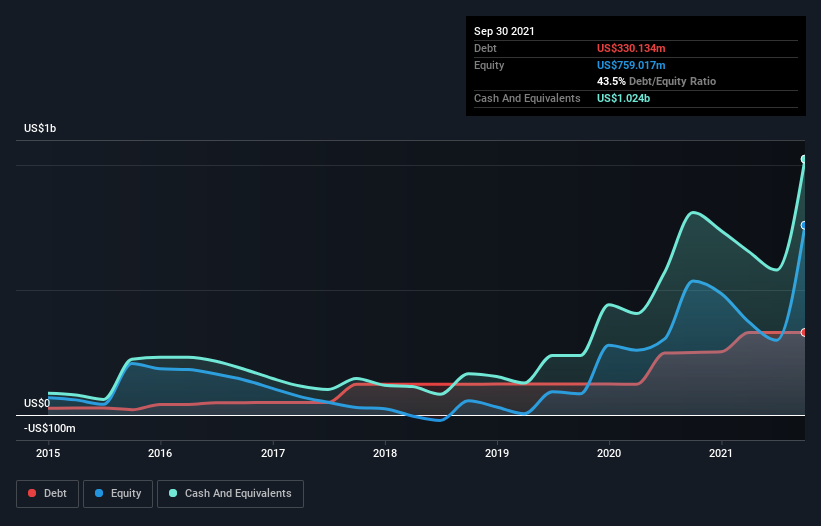
Warren Buffett famously said, 'Volatility is far from synonymous with risk.' When we think about how risky a company is, we always like to look at its use of debt, since debt overload can lead to ruin. We can see that Natera, Inc. (NASDAQ:NTRA) does use debt in its business. But is this debt a concern to shareholders?
What Risk Does Debt Bring?
Debt assists a business until the business has trouble paying it off, either with new capital or with free cash flow. Ultimately, if the company can't fulfill its legal obligations to repay debt, shareholders could walk away with nothing. However, a more frequent (but still costly) occurrence is where a company must issue shares at bargain-basement prices, permanently diluting shareholders, just to shore up its balance sheet. Of course, debt can be an important tool in businesses, particularly capital heavy businesses. When we examine debt levels, we first consider both cash and debt levels, together.
View our latest analysis for Natera
What Is Natera's Net Debt?
As you can see below, at the end of September 2021, Natera had US$330.1m of debt, up from US$250.0m a year ago. Click the image for more detail. But on the other hand it also has US$1.02b in cash, leading to a US$693.6m net cash position.

A Look At Natera's Liabilities
The latest balance sheet data shows that Natera had liabilities of US$199.7m due within a year, and liabilities of US$352.6m falling due after that. Offsetting this, it had US$1.02b in cash and US$110.4m in receivables that were due within 12 months. So it can boast US$581.8m more liquid assets than total liabilities.
This surplus suggests that Natera has a conservative balance sheet, and could probably eliminate its debt without much difficulty. Simply put, the fact that Natera has more cash than debt is arguably a good indication that it can manage its debt safely. The balance sheet is clearly the area to focus on when you are analysing debt. But it is future earnings, more than anything, that will determine Natera's ability to maintain a healthy balance sheet going forward. So if you're focused on the future you can check out this free report showing analyst profit forecasts.
Over 12 months, Natera reported revenue of US$565m, which is a gain of 56%, although it did not report any earnings before interest and tax. Shareholders probably have their fingers crossed that it can grow its way to profits.
So How Risky Is Natera?
We have no doubt that loss making companies are, in general, riskier than profitable ones. And in the last year Natera had an earnings before interest and tax (EBIT) loss, truth be told. And over the same period it saw negative free cash outflow of US$354m and booked a US$408m accounting loss. While this does make the company a bit risky, it's important to remember it has net cash of US$693.6m. That means it could keep spending at its current rate for more than two years. Natera's revenue growth shone bright over the last year, so it may well be in a position to turn a profit in due course. Pre-profit companies are often risky, but they can also offer great rewards. When analysing debt levels, the balance sheet is the obvious place to start. But ultimately, every company can contain risks that exist outside of the balance sheet. Case in point: We've spotted 2 warning signs for Natera you should be aware of.
If you're interested in investing in businesses that can grow profits without the burden of debt, then check out this free list of growing businesses that have net cash on the balance sheet.
Valuation is complex, but we're here to simplify it.
Discover if Natera might be undervalued or overvalued with our detailed analysis, featuring fair value estimates, potential risks, dividends, insider trades, and its financial condition.
Access Free AnalysisThis article by Simply Wall St is general in nature. We provide commentary based on historical data and analyst forecasts only using an unbiased methodology and our articles are not intended to be financial advice. It does not constitute a recommendation to buy or sell any stock, and does not take account of your objectives, or your financial situation. We aim to bring you long-term focused analysis driven by fundamental data. Note that our analysis may not factor in the latest price-sensitive company announcements or qualitative material. Simply Wall St has no position in any stocks mentioned.
Have feedback on this article? Concerned about the content? Get in touch with us directly. Alternatively, email editorial-team (at) simplywallst.com.
About NasdaqGS:NTRA
Natera
A diagnostics company, provides molecular testing services worldwide.
Flawless balance sheet and slightly overvalued.
Similar Companies
Market Insights
Community Narratives



